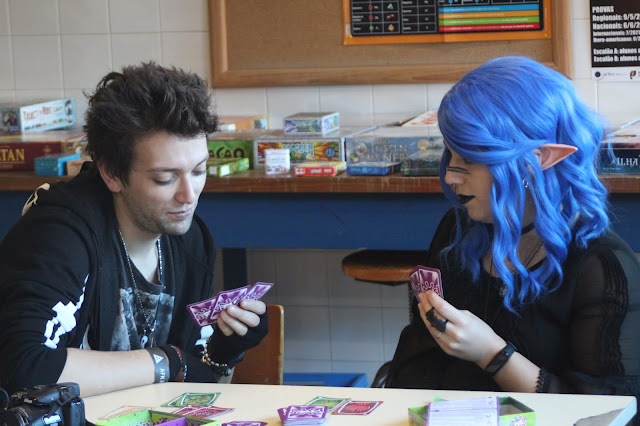Japanese pop culture and K-pop.
Gaming and tournaments
And also board games.
At the A.F.K Party, organized by FriendZone, at the Rio Novo do Príncipe School in Cacia, near Aveiro, Portugal.
With the Boardgamers Group of Aveiro running the board game section, there were over thirty titles available for the day, suiting all tastes, ages and gaming experience.
From the classics of the late twentieth century, such as Catan and Carcassonne, to those published on the first decade of this century, such as Ticket to Ride or Pandemic, and to the most recent ones, just released in 2019, such as The Taverns of Tiefentahl or Century – A New World.
In a dedicated room, outside the action and the main focus of the meeting, the tables were in action all day long. With people looking to discover games, take a break from other activities or repeat family worlds.
The boardgame room was somewhat outside the centre of the event and the main action. Even so, there was intense action on the tables during all day! With people looking to discover some games, or for a break from the other activities, or even to comeback with friends to already well-known worlds.
This was also the opportunity to experience another handful of games.
At four-player count.
Or three.
Or two.
Century: New World is already the third one in the Century series, but the very first one I played. With the scenario set in the exploration of the Americas, it is a resource management game, which is necessary to collect and exchange various resources.
Specific resource combinations allow you to obtain cards, which in turn provide points, enable access to new board spaces and expand the capability of action, in number or in kind.
The interaction between players, as it is the case in many of these games, focuses on competition for available resource and action spaces.
The Game. Cards with numbers from 2 to 99. To place in two ascending series and two descending series. In collaboration with the other players, but not knowing what each one holds in their hand. Trying to place them all, or at least as many as possible.
Being mandatory to place at least two cards per turn, big jumps in the number sequence become inevitable, sooner or later, hindering the ultimate goal.
A quick game, to play anywhere.
Dragon Castle is a 2017 game, which reminds of the digital Mah-Jong solitaire, where you draw pairs from an initial pyramid of tiles.
Inhere, this pair drawing action is, in fact, the only similarity between both games. The taken tiles are then to be place on the player’s board, to form adjacent groups of the same suit. Once completed, these are turned, enabling the construction of the castle to reach one step higher.
To complete the set there are some Chinese roofs to place on top, yielding more points in the final scoring, beyond, of course, the neat aesthetic touch.
7 Wonders Duel is a game pertaining to the 7 Wonders family, but with its own rules, designed for an experience at two players, a duel, as the name well indicates.
It is a game of civilization development, including the construction of some of the wonders of the world, all the features represented by cards.
There are cards that provide resources and resources that allow you to purchase new cards; some cards are visible from the beginning of the game while others must be discoveries as the duel progresses; cards that grouped are more valuable; a tug-of-war representing military strength; and a bunch of scientific discoveries.
With each player starting with different wonders to build, it is natural that both strategies quickly become very different, adding to the challenge. But in no case one may neglect any of the main areas of development, to the risk of an anticipated and decisive defeat.
An excellent impression from this first play.
And to wrap-up, Onitama, an abstract game, which we can include in the wide chess family.
he main originality is on the movement mechanism, based on cards and not on the characteristics of each piece, as it is most often the case. Each card, named after an animal, represents a different movement pattern, which can be used at will for any one of the player pieces. But beware! The card you play will then become one of the opponent’s cards, and may
This card rotation, meaning an ever-changing possibility of movements, demands a fresh new way of thinking during the course of a game. And since there are more cards than the five used for each match, there is a great variability and thus an enhanced replayability.
With:
Nuno Rebelo
Pedro Chuva
Nuno Gonçalo
Jorge Teixeira
Step in and leave your PAW print - Playing Around the World - and follow the PAW tag.
Send a photo of a gaming session, the game title, your name, city, country (and, if you feel like, a short sentence about the game and or a photo of the city) to gamesinbw@gmail.com.










No comments:
Post a Comment